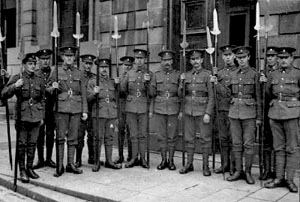l'Assise d'Heritage
A Halbadier guard provided by the Militia
|
The Assise d'Heritage is a relic of the days when Jersey was entirely under the feudal system; the Chief pleas of the first day of the sitting of the Court of Heritage was formerly of great importance and had the power of making ordinances.
Two sittings a year
At present the Assise is held twice a year, on the Thursday after 4 May and the Thursday before 11 October.
The Principal Feudal Seigneurs or Lords holding "in capite" from the Crown are bound to appear when called by the Procureur General and to answer to their names (suite de cour), either by themselves or by Procureurs duly authorised by them. They answer "Je Garde" signifying "I have kept my appointment". Three consecutive defaults are followed by the resumption of their Fief by the Crown. The Lieut-Governor is usually present at the Assise d'Heritage, to appear as representative of His Majesty whose predecessor Henry V had confiscated the Alien Priories in 1413.
Francs tenants
The Seigneurs who owe comparence at the Assise d'Heritage, and who are called francs tenants are the following :-
- The Governor, for the Bishops, Abbots and Abbesses
- Seigneur de St Ouen
- Seigneur de Rozel
- Seigneur de Meleches
- Seigneur de Samares
- Seigneur de la Trinité
- Seigneur de St Germains
- Seigneur de Dielament
- Seigneur de St Jean la Hougue Boëte
- Seigneur des Augrès,
- Seigneur du Fief Luce de Carteret
- Seigneur de la Hague.
- Seigneur de des Arbres.
- Seigneur du Franc Fief en St Brelade
- Seigneur du Fief es Hormans
- Seigneur du Fief es Poingdestres
Ancient custom
The suite de cour, now a mere formality, was not always so; it was a duty not only for the francs tenants to answer to their names, but for them to form part of the Royal Court to judge, deliberate and determine with the King's Jurats the judgments of the Royal Court; that is why they are invited to the dinner prepared in the King's name and held after its sitting, Edere cum Rege ter in Anno, a custom older than the Conquest.
At the commencement of this century at a sitting of the Cour d'Heritage an application was made to register an agreement between parties relating to real property ; the Baili1f, after consulting the Jurats on either side, turned to the Banc des Seigneurs and also asked the Seigneurs for their approval. This is a very rare occurrence.
Suite de Cour must not be confused with the ceremony of the francs tenants performing hommage for the Fiefs; this ceremony can only be performed when the King is present in person in the Island, and was last carried out in 1921 when King George V visited Jersey. (Performed again for Queen Elizabeth - Ed)
--Prevots and Chef Sergents== At the Assise d'Heritage the Prevots du Roi and the Chef Sergents of the different parishes are then called upon by the Procureur General du Roi to declare whatever may have come to their knowledge in their various districts that may add to the revenue of the Crown. They are summoned to declare before the Court all they know of any forfeitures, escheats, tenants dying without direct heirs, confiscations of property of criminals convicted of treason, murder, striking or threatening a judge, vacant lands, estates without heirs, wreckage, treasure trove, and other casual profits which might be claimed by the King.
The Prevots then hand in their written declarations generally containing a list of persons who have died without direct heirs, and those who are presumed to be dead, which are signed by the Prevot and the Chef Sergent. A large part of the King's revenues was received from these sources through the King's Prevots, including the fines or amercements inflicted by the Royal Court for crimes and misdemeanours as laid down from time to time by the ordinances made at the Chief Pleas of the Court. The Prevots handed the moneys received to the Perceptor domini Regis (the King's Receiver General), a very ancient office.
Oaths of office
The Advocates renew their oath of office, and land surveyors (Arpenteurs) are appointed and sworn at the Assise d'Heritage, The Court is then adjourned for a fortnight to deal with any cases to be submitted to the Court.
It is to be noted that during the centuries before the States came into being, the Chief Pleas of the Court of Heritage was the governing body of the Island; it was the means of raising money for the Crown through the feudal system, and these moneys were spent by the Receiver-General on the upkeep of the Castle, the Court House, the Prison, the salaries of the Crown officials, etc. The Militia and the roads were largely a parochial responsibility of the Constable, the Centeniers and the Vingteniers of the Parish, who had to supply the Militia with arms and ammunition,
The poor and the sick were looked after by the religious houses in the Island, until the confiscation of the alien priories in 1413. After the Reformation, the Surveillants and Almoners of the parishes took their place.
Education was largely in the hands of the Church. This included the two grammar schools, which were founded in 1496. Saint Anastase in St Peter's Parish and Saint Mannelier in Saint Saviour's.
Parish consultation
The development of the States from this Royal Court is interesting. In course of time the Rectors and Constables, as representatives of their parishes, were called in to advise the Jurats and the Seigneurs. The Constables were especially consulted in the raising of money in the parishes for the upkeep of the Militia, the defence of the Island, and general purposes.
This practice of consultation in course of time became settled, with the result that the Rectors and Constables soon became invested with the power of voting in the Assembly. In the 15th century this mixed assembly was called the States, and began to sit as an independent body.
The Chief pleas of the Cour d'Heritage continued to make ordinances concurrently with the States until the year 1771; at the Chief Pleas held on 28 September 1769, a serious riot broke out in the Royal Square, the people entered the Court House, armed with sticks, and forced the Court there and then to pass certain ordinances to redress their grievances. This led to the sending to Jersey from England of a Special Commission to inquire into the cause of these disturbances, and the affair terminated in the passing of the Code of Laws which was sanctioned on 28 March 1771, by an Order-in-Council which went further, and ordered that in future the Royal Court would not be allowed to make any further laws, but all legislation was to be carried out by the States.
Jerseymen should therefore take great interest in this most important ceremony of the Assise d'Heritage, as it is the basis of our constitution; from it originate all our Courts, as well as our Legislative Assembly, the States of Jersey.

